|
The day’s events opened with patriotic music by
the Atlanta Community Band.
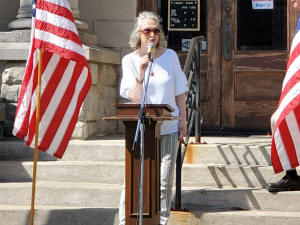
After Cathy Maciariello briefly welcomed everyone to celebrate the
service of so many of this country, Cub Scout Troop #4128 led
attendees in the Pledge of Allegiance.
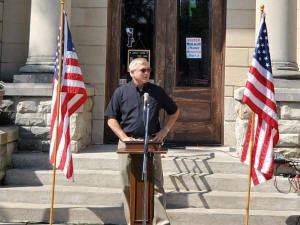
Atlanta Mayor Adam McVey shared remarks thanking the scouts, the
band and many volunteers who helped to put the event together.

People across this country gave their lives on both U.S. and foreign
soil. McVey said the challenge is what traditions are you passing on
to children or grandchildren so they can remember what your parents
or grandparents gave up.
Whether sending a dad, grandfather, son or brother off to fight in a
foreign war or to protect our freedoms on this country’s land, many
sacrifices have happened over the years. McVey said it is good to
have the flags and library as a personal backdrop so we can remember
those sacrifices.
McVey then told a story about his late father. McVey said his father
was in the Navy for four years, but the Navy was part of his life
for 62 years. McVey’s father often shared stories about the Navy,
its importance and the lessons he learned.
On one occasion, McVey’s father was in Branson with a longtime Navy
friend. At one of the entertainment venues McVey said they played
the National Anthem.
A man in front did not stand up, so McVey’s father quietly said, “I
believe you can stand up.” When the man did not stand, McVey’s
father spoke more sternly and forcefully telling the man he should
stand up to honor those people who gave their lives. Finally, the
man reached under his chair, grabbed a cane and stood up.
The friend thought McVey’s father might feel bad that the man had to
grab a cane to stand up. His father’s replied, “he was able to walk
in and he will be able to walk out, so I’m sure he can stand during
the National Anthem.” McVey’s father told the man sometimes you just
need a little more motivation to do the right thing.
The story has stuck with McVey ever since he heard it. He said
sometimes we just need a little bit more motivation to do the right
thing. McVey hoped everyone found motivation to remember and honor
those who gave their lives so we can have the freedoms valued in
this country today.
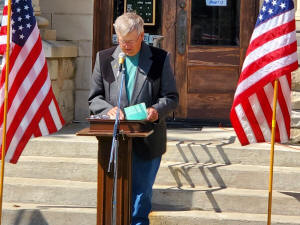

In an opening prayer by Dennis Smith, he thanked God for those who
came to honor and respect those who served and died for our country.
On this day we also remember the relatives, husbands, wives, and
children who have mourned the deaths of our honored and remembered
service men and women. Smith asked the Lord to grant each one of
them a place in his sacred and forever home so those who have
suffered may find victory there.
Maciariello next spoke about America’s Founding Imagination. On June
21, 1788, after New Hampshire became the thirteenth state to ratify
our constitution as our country embarked on momentous journey.
This journey is one Maciariello said has produced the most diverse
and longest surviving example of constitutional democracy in the
world.
Standing today before a building that represents learning and
knowledge, Maciariello said we honor those who have served and
defended this nation and its remarkable identity.
To put their service in context, Maciariello read our cherished
founding words and principles. The preamble to the constitution
begins with “We the people of the United States in order to form a
more perfect union.” It goes on to state the principles of common
defense, general welfare and the blessings of liberty.
As Maciariello said, these founding values are embedded in every
public statement we make today as a citizenry. We may even say some
of the words without thinking about them.
We sing “My country tis of thee, sweet land of liberty.” We say,
“land of the free and home of the brave.” We pledge “One nation
under God with liberty and justice for all.”
We celebrate these words from the Declaration of Independence: “We
hold these truths to be self-evident that all men are created equal,
and they are endowed by their creator with certain unalienable
rights…that among these are life, liberty and the pursuit of
happiness.”
Over the years, Maciariello said these resounding words have been
used for a variety of purposes. They have even been used to validate
individual autonomy and happiness over the collective well-being.

Our founders were educated men, which Maciariello said is important
to understand. They were schooled in the Greek classics and
Aristotelian Philosophy in which happiness meant the happiness of
higher society. The Greeks and our founders believed individual
happiness could only be achieved when the whole society shared a
dedication to common values. That is noted in the Declaration and
Constitution.
Maciariello said it was only in such a fair and just society that
men and women could be fully human and therefore happy. Put simply,
we are all in this together for the good of each other’s happiness
and the collective happiness of society.
These original ideas were on the great seal of the United States,
which says, “E Pluribus Unum,” meaning out of many, one. Maciariello
said there are 13 letters in this phrase like thirteen colonies and
thirteen stripes on the American flag.
A grand ambition inspired our founders. However, as Maciariello
said, they were not perfect. They were flawed and often did not
embody the ideals enshrined in the language of that moment in their
lives.
When adopted, the founders knew the constitution
was not perfect. Maciariello said they did not always agree, arguing
over ideas at great length. What they did was opt for compromise to
move forward and progress towards liberty.
The founders knew the constitution was unfinished.
Maciariello said Thomas Jefferson believed the constitution should
be expired and rewritten about every 20 years. It is why there is a
provision in the constitution for amendments.
[to top of second column] |
 Presently there are 27 amendments. Maciariello
said a 28th amendment about equal rights is awaiting certification
from the National Archives.
It took 100 years to free slaves and extend them the right to vote.
It took until 1913 for senators to be elected by the people
democratically. It took until 1920 to give women the right to vote.
It took until 1971 for those aged eighteen to be eligible to vote.
The founders trusted in posterity and in us to continue to observe
and understand our evolving history and fix their mistakes.
In referring to the constitution Maciariello read from what James
Wilson wrote in 1787. Wilson said, “If there are errors, it should
be remembered that the seeds of reformation are sown in the document
itself.”
Years later, Maciariello said Governor Morris, who wrote the
preamble reflected on the limitations of the Philadelphia
Constitutional Conventions’ deliberation. Morris said, “We did the
best we could.”
The constitution has always been a living breathing document.
Maciariello said it represents the beautiful journey of the country
towards a more perfect union. It is not finished, never finished,
not perfect but always evolving towards wholeness.
Out of many (people,) one (nation) was the dream of the founders, as
well as the dream of Abraham Lincoln and of Martin Luther King.
At best, Maciariello said America has always aspired to be more than
the zero-sum game in which someone must surely lose while someone
else gains.
Here instead is the abundance of the God in whom we trust, who calls
us to do justice, love mercy and walk humbly. Maciariello said that
is what we celebrate today as we honor those who have served and
defended us for 250 years. Their service requires much of us. The
world still looks to us. We cannot afford to be passive
participants.
At the time of Abraham Lincoln’s first inaugural address in 1861,
Maciariello said the country was on the brink of a Civil War he
desperately wanted to avoid.

In this address Lincoln said, “We are not enemies. We must not be
enemies. Though passion may have strained it must not break our
bonds of affection. The mystic chords of memory, stretching from
every battlefield and patriot grave to every living heart and
hearthstone all over this broad land, will yet swell the chorus of
the Union, when again touched, as surely they will be, by the better
angels of our nature.”
Lincoln could not stop the coming devastation. However, as
Maciariello said he looked forward with hope and a belief in the
values that motivated our founders. Those visionaries also call us
to set our eyes on the future. It is what has made us dream,
persevere and adapt. It is what one day may truly make us great.
In Barack Obama’s 2017 farewell address to the nation the President
talked about what we mean when we say America is exceptional. Not
that our nation has been flawless from the start, but that we have
shown the capacity to change and make life better for those who
follow.
As we honor our veterans and those currently serving in the
military, Maciariello said we must understand and embrace the truth
of our history and contemporary life. [We must remember] the
inspiring successes and terrible failures. [We must have] a thirst
for knowledge and understanding, clear unbiased eyes and strong,
fearless, honest and unencumbered hearts.
Quoting Civil Rights activist James Baldwin, Maciariello said, “If
we don’t [do these things], we are doomed.” Baldwin wrote that we
dig trenches to redirect uncomfortable memories and get them to flow
away from us. Like the mighty Mississippi River, the memories always
return, flooding everything no matter how high we built the stilts.
What Maciariello said is that we must be able to acknowledge and
hold two stories in our heads. Our history, flawed as it may be, and
our dream of the future, calls out in hope to the better angels of
our nature. The dream is not behind us. It lives somewhere in the
future.
We need to look forward to the beautiful shining city on the hill
Maciariello said President Reagan described in his 1989 farewell
address.
It is this journey of discovery Maciariello said our founders could
only imagine that has called so many of many men and women into
military service.

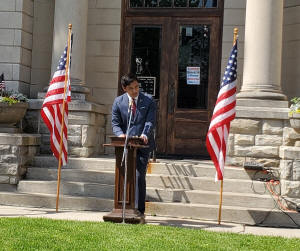
Maciariello then introduced one of those men, recently retired
United States Army Captain Miguel Ortiz. Captain Ortiz gave the
keynote address. [See article:
Retired United States Army
Captain Miguel Ortiz remembers, “When you raise your right hand to
take that oath, understand you are writing a check to the American
people for a value up to and including your life.”]
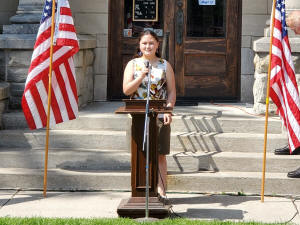
Once Ortiz finished speaking, Azul Kong sang the National Anthem.
During the veteran recognition, the band played music representing
each branch of service. Maciariello asked veterans to stand and be
recognized when their song was played.
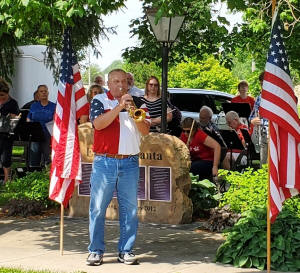
Toward the end of the observance, American Legion Post #341 did the
honor guard salute followed by taps.

In his closing prayer, Smith honored the fallen. He gave thanks to
God for all the volunteers and those who came to pay tribute to the
fallen.
Once the observance was over guests were encouraged to visit the
Atlanta Museum, which featured an exhibit of military uniforms.
For the final event of the day, members of Audra’s Dance Studio
performed on the street outside the Atlanta Public Library.
[Angela Reiners] |